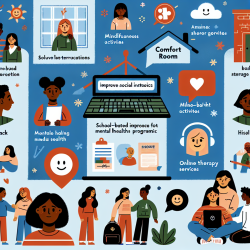The COVID-19 pandemic has left an indelible mark on society, affecting not only our physical health but also our mental well-being. One of the most significant impacts has been on young people's social interactions, particularly as they transition back to in-person schooling. Recent research titled "Promoting Positive Social Interactions: Recommendation for a Post-Pandemic School-Based Intervention for Social Anxiety" offers valuable insights into addressing these challenges.
The Challenge of Social Anxiety Post-Pandemic
As schools reopen and students return to face-to-face learning environments, many are experiencing heightened levels of social anxiety. The prolonged period of remote learning and social isolation has disrupted normal social development, leading to increased stress and anxiety about interacting with peers in person.
This research highlights the importance of understanding the pre-pandemic, pandemic, and post-pandemic social interaction behaviors of students. By evaluating these behaviors, educators and practitioners can identify problematic patterns and implement targeted interventions to improve social skills and reduce anxiety.
A Comprehensive School-Based Intervention
The proposed intervention is a four-section workshop designed to encourage students to engage more in-person rather than online. The workshop includes:
- Self-reflection and Discussions: Encouraging students to reflect on their social experiences and anxieties.
- Motivational Interviews: Facilitating peer-to-peer interviews to explore motivations for improving social interactions.
- Informative Treatment: Providing students with knowledge about effective social strategies.
- Workbooks: Allowing students to create personalized plans for enhancing their social lives.
This structured approach not only helps students recognize their current challenges but also empowers them with the tools needed to overcome them. Teachers play a crucial role in guiding these sessions and fostering a supportive classroom environment.
The Role of Educators and Schools
The success of this intervention relies heavily on the active participation of educators and school administrators. Teachers can lead by example, creating a classroom culture that values open communication and collaboration. Schools can further support this initiative by offering extracurricular activities that promote social engagement and by providing resources for mental health support.
The Path Forward
This research underscores the need for schools to adopt comprehensive strategies that address the holistic needs of students. By implementing evidence-based interventions like the one proposed, schools can play a pivotal role in mitigating the negative effects of the pandemic on student well-being.
If you're a practitioner looking to enhance your skills or an educator seeking effective strategies for your school, consider exploring this research further. It offers a roadmap for creating supportive environments where students can thrive socially and academically.










